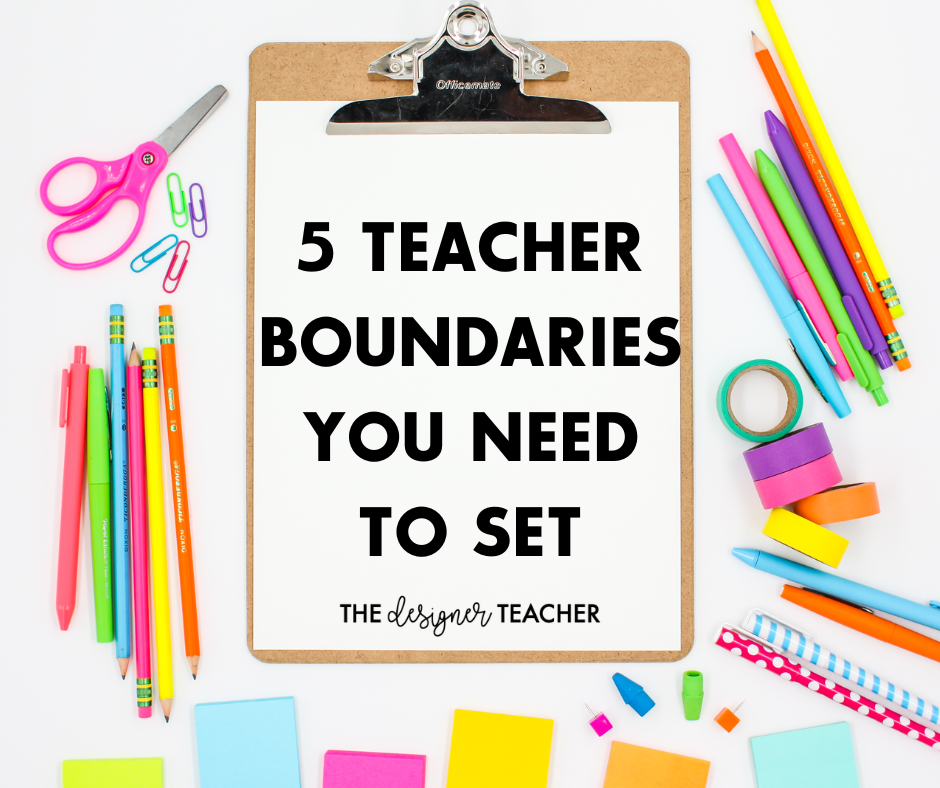5 Teacher Boundaries You Need to Set
Not all teachers' boundaries will be the same, and that's okay. Teachers are in different stages of their lives and careers. If you have children, you may find that the amount of time or money you're willing to spend on your classroom has drastically decreased. Or, you might just realize that you’re on the path to burnout if you keep up your current practices. But even if you're young, childless, and new to the profession, you should still have boundaries set. These will help you to maintain a work-life balance that makes teaching a more sustainable career. Setting boundaries before you desperately need them is even better!
What time you go home in the afternoon. This may look different from teacher to teacher, and that’s fine! If you’re able to leave (or have to, such as to pick up your kids) immediately after school ends, great! If you do decide you’d like to stay after school to prepare for tomorrow, set a firm boundary. I’d recommend no longer than one hour. If you stay much longer than that, you’ll have hardly any time to yourself before you’re back at school the next day. If you do nothing but work and sleep, you’ll burn out quickly.
2. When parents can contact you. Again, this will differ from teacher to teacher, but making this boundary clear to parents up front will make it easier to stick to your limits. For you, this may look like not giving your students’ parents your number at all. Or, you might say that email is the best way to contact you, and that you will reply within 24 hours, but for an urgent matter, they can call before 8 pm. Parent communication is great, but it’s not your job to be on call 24/7.
3. Maximum amount of time spent on work on the weekend. You are only obligated to work your contract hours, but I know this isn’t realistic for most teachers. If you plan to do work on the weekends, limit it. If you just say, “I’ll work on lesson plans on Sunday,” it may end up taking up your entire day, or, you might procrastinate and then be rushed and stressed Sunday evening. Instead, set a limit and time. For example, “I will complete my preparation for the week between 2-4 on Sundays.”
4. Number of non-mandatory events or activities you will volunteer for. As a teacher, you constantly get asked to volunteer at events or join committees. Decide your limit upfront and then be firm. If your limit is helping with one after school event this year, simply say that when you’re asked to participate in another.
5. How much (if any) money you will spend on your classroom/students. It’s honestly unacceptable that teachers often have to fund their own classrooms. Teaching is already a chronically underpaid career, and then you’re expected to provide supplies too?! That being said, I know many of us would ultimately rather buy the supplies or materials than have our students go without. There are also times when spending money will save you a significant amount of time (like TPT resources), and that may be worth the trade off. Regardless, set a limit now or things can quickly get out of hand! Personally, mine was $50/month. If yours is zero, that’s completely fine! But for me, I knew I was going to buy some things, so I decided to set a realistic budget and stick to it.
Once you’ve set boundaries, it’s not always easy to stick to them! Try writing them down in a journal or a note on your phone to help you commit to them. Communicate them clearly and calmly when you’re asked to go beyond them.
If you found these boundaries helpful, check out The Teacher’s Guide to Self-Care, a practical guide to building resilience, avoiding burnout, and bringing a happier and healthier you to the classroom.
No time to read now?








